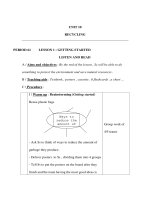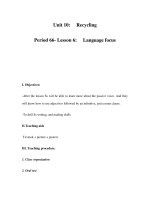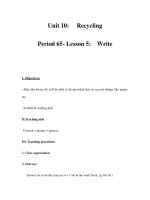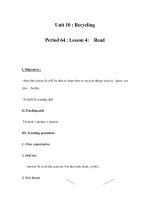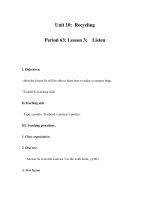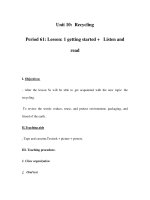12792 recycling
Bạn đang xem bản rút gọn của tài liệu. Xem và tải ngay bản đầy đủ của tài liệu tại đây (58.18 KB, 3 trang )
Gloucester family cuts waste to one rubbish bag a year
By John Maguire
BBC Points West
The Strauss family aim to pr
landfill rubbish this year
When it comes to household recycling, one family in Gloucester take some beating. They have cut the wa
they produce to just one bag a year.
Where many families put their bin out once a week or once a fortnight, the Strauss family put theirs out just once a
Richard, 52, his wife Rachelle, 37, and eight-year-old Verona recycle everything they can at their home in Longhope
Forest of Dean.
'Careful not frugal'
"It's about changing the way that you shop initially so that you're looking at the product and making sure that the
packaging it comes in is not something that's excessive or something that you know you can either compost or recy
afterwards," Richard explains.
Butcher Kevin Brown says th
family are an inspiration
A family holiday during the Boscastle floods in Cornwall prompted them to think about the impact the human race ha
environment, and has led to a change in their habits.
They insist they live a very normal life; they are not frugal - just careful.
I went with them to their local shops and Kevin's Butchers in nearby Mitcheldean. I noticed many shoppers in the str
SECRETS OF EXTREME RE
Pick packaging that can be
or recycled
Take containers into shops
loose products home
Compost paper and cardboa
either compost or use a wo
vegetable peelings, fruit cor
crumbs
Sort bottles, cans and most
for kerbside collection or ta
recycling depots
Reuse wire and plastic ties
packaging to support plants
garden
re-usable bags, but the Strauss family go one better - even taking their own containers along.
"When you buy meat and vegetables from your local store you can buy exactly the amount you want. No food waste
cheaper," Rachelle says.
The butcher, Kevin Brown, is impressed. "They've opened up our eyes really to what we do waste. They're a bit of an
inspiration," he says.
"Over the last 12 months I've seen a heck of an increase in people bringing their own bags in. I used to offer everyo
carrier bag and everyone used to take one. But not anymore."
After carefully selecting food with minimal packaging the next step is to deal with the rubbish after the food has bee
Where many of us find our kitchen bin - under the sink - Richard and Rachelle keep their tea towels.
"It makes us think about exactly what we're throwing away," Richard advises.
Vegetable peelings, fruit cores and crumbs go either into the compost or wormery. Tissues, paper and cardboard a
composted.
Bottles, cans, and most plastics are sorted either for kerbside collection or taken to recycling depots in the Forest of
I wondered about Christmas, and especially those little wire and plastic ties that most children's toys seem to come
these days.
"I use them to tie up my tomato plants," Rachelle says. She seems to have a use for everything.
All that is left are crisp packets and some plastics. Once squashed, a year's worth fits almost perfectly into their old
bin.
The Strausses insist anyone can cut their waste - perhaps not to the extent they have but so much more is possible
every little step makes a difference.
So, just one bin for 2009 - what's ahead in 2010? "Zero waste. No landfill rubbish, no bin," Richard says.
Richard and Rachelle are not concerned about the past, they are determined to improve the future.


